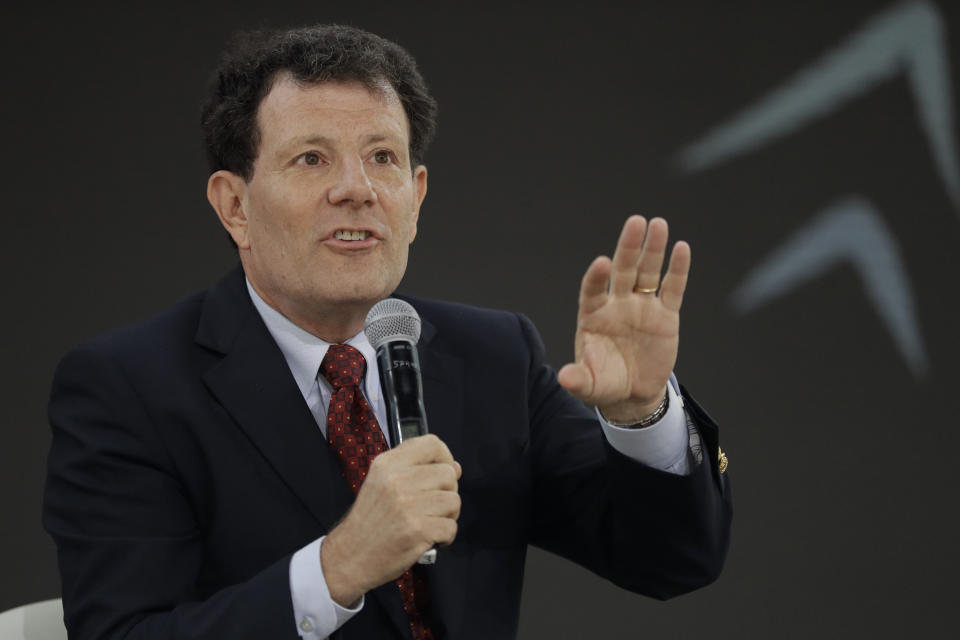2020 election Biden landslide ‘more likely’ than Trump win: Nicholas Kristof
Less than two weeks before Election Day, President Donald Trump faces on average a double-digit deficit in the polls that has pushed Republicans to distance themselves and Democrats to take positions on nominee Joe Biden’s potential Cabinet.
But the outcome remains in doubt, says New York Times columnist Nicholas Kristof. In a new interview, Kristof told Yahoo Finance that Trump still has “a path” to victory but that it’s more likely Biden will win in a landslide than Trump will win at all.
“There is a possibility that things will come together [for Trump],” said Kristoff, who has written for the Times in various capacities since 1984.
“I think it's unlikely. I think that it's more likely that Joe Biden will win in a landslide, than that Trump will win at all,” says Kristof, a liberal who supported former Secretary of State Hillary Clinton’s bid against Trump in 2016.
Kristof co-created a new documentary entitled “Tightrope: Americans Reaching for Hope,” based on a book co-authored with his wife and former Times reporter Sheryl WuDunn that chronicles how rising inequality has impacted his hometown of Yamhill, Oregon.
A small chance but the possibility of an ‘October surprise’
As of Wednesday, a presidential forecast calculated by FiveThirtyEight gave Trump a 12% chance of winning the election, in keeping with a polling average compiled by the news organization that showed Trump trailing Biden by 10.2 percentage points. On October 21, 2016 — the same date four years ago — the FiveThirtyEight forecast gave Trump a slightly higher but still chance of winning his race against Clinton: 13.5%.
Some observers say the results of the election remain up in the air, citing polls in October 2016 that gave Democratic nominee Hillary Clinton a lead as high as 14 percentage points. Others point to the potential for an “October surprise,” a news development that could significantly influence voters. Many note that 2016 election’s surprise came in the form of an announcement made by then-FBI Director James Comey about an investigation into Clinton’s email server just 10 days before the election.
There could be other surprises in 2020. For instance, Trump has sought approval for a coronavirus vaccine before Election Day, which might significantly improve perception of his handling of the outbreak. A major shift in the race may also occur if a member of the Democratic ticket contracts COVID, which FiveThirtyEight Editor-in-Chief Nate Silver raised in an interview last week with WNYC’s “On the Media.”

Kristof spoke to Yahoo Finance Editor-in-Chief Andy Serwer in an episode of “Influencers with Andy Serwer,” a weekly interview series with leaders in business, politics, and entertainment.
Even if the electoral vote tally comes down in favor of a given candidate, Kristof warned of a “nightmare” scenario in which state leaders defy the results, sending delegates to the electoral college who support a preferred candidate rather than the one widely believed to have won the states’ popular vote.
Over the spring and summer of this year, Democrats and Republicans in each state nominated their electors, who are expected to cast their vote for the party nominee if they win the state’s popular vote. On Dec. 14, electors will meet in each state and send their formal vote to Congress.
But disputed election results in selected states could result in the leaders of those states picking electors from a party whose candidate is widely believed to have lost the state’s popular vote, Kristof said.
“Some states could send electors to the Electoral College who it is widely felt do not represent what happened in that state’s election,” Kristof says. “For purely partisan reasons.”
CNN host and columnist Fareed Zakaria echoed Kristof’s concerns in the Washington Post in September.
A report in the Atlantic in September found the Trump campaign has discussed such a scenario, citing sources in the Republican party at the state and national level. Under the reported contingency plan, the Trump campaign would put pressure on swing states with Republican-controlled legislatures to call the election for Trump and urge loyal electors to cast their formal vote him.
“We don't really have a clear playbook to determine how to address that,” Kristof says. “I hope that it is a decisive election.”
Read more:
COVID-19 forced pivot 'to a new future' for Make-a-Wish Foundation: CEO Richard Davis
David Chang: Restaurant failures could have ‘severe repercussions' for other businesses
Bill Gates: We should be able to ‘manufacture a lot of vaccines’ next year
Netflix co-founder on creative culture: We ‘manage on the edge of chaos’
Read the latest financial and business news from Yahoo Finance
